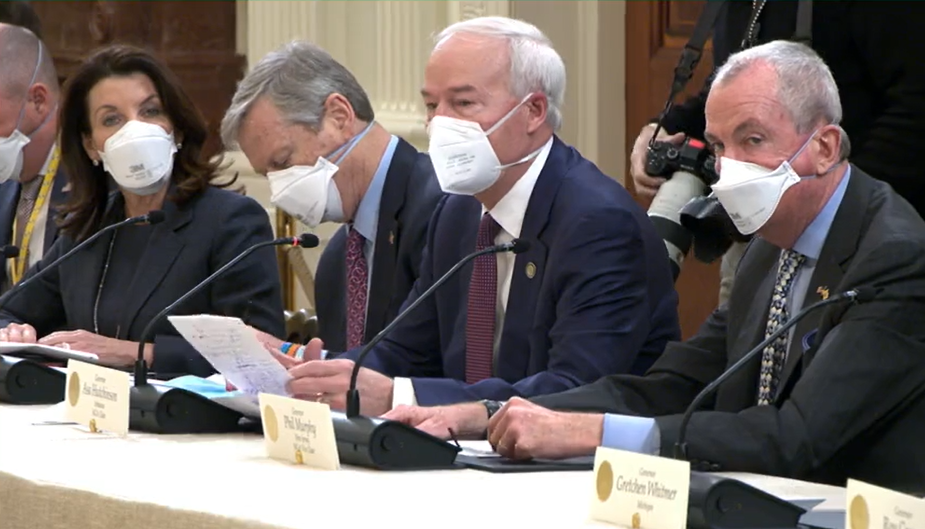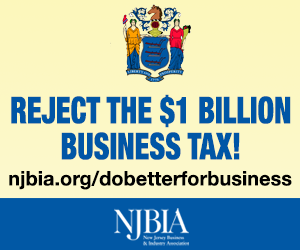Murphy and the Prospect of a Virus that is Here to Stay

Gov. Phil Murphy’s concession — belated, according to his critics — that New Jerseyans must accept living with the COVID-19 virus is an inevitable acknowledgement that the state and the nation have fought it to a draw and clear cut victory is unattainable.
It was, moreover, a tacit admission that vaccinations have reached saturation point with 6.2 million eligible New Jerseyans — approximately 70 percent — having received either two shots (3.75 million) or two shots plus a booster (2.47 million) and further efforts to increase the rate will yield negligible results.
Vaccine hesitancy — aside from medical or religious exemptions —- will remain at or very near current levels.
And, while Murphy has been clear he will not impose vaccination mandates or passports, the private sector is free to do so as a condition for admission to restaurants, mass transit, airplanes, theaters, entertainment or athletic venues or large gatherings. The same applies to wearing protective masks.
For nearly two years, Murphy has maintained his decisions on lockdowns, closing schools and businesses, prohibiting large gatherings and mask wearing mandates have been guided by medical science as the virus rampaged through the population, infecting 1.8 million and killing nearly 32,000.
For the past several months, a growing number of public health experts, medical leaders and researchers have predicted that COVID will soon become endemic similar to influenza with seasonal outbreaks and annual vaccinations likely will be necessary to control its spread.
Murphy has accepted their outlook and conceded the prospect of eliminating the virus has vanished and the state’s approach to dealing with a resurgence will of necessity change.
While public health considerations influenced Murphy’s decision, it is inarguable that a weary and frustrated public anxious to restore pre-pandemic life played a role in his decision.
His Administration had come to be defined by the pandemic whose impact consumed very nearly half of his first term.
The virus — with no cure or treatment available — swept through the state before the late 2020 development and distribution of an effective vaccine began to bring it under control and lead to relaxing restrictions. The sudden emergence of omicron, a highly contagious variant, forced a reimposition of emergency limitations, although less intense.
While omicron initially drove infections and hospitalizations to alarming levels, they’ve since fallen steadily, indicating it has run its’ course.
Murphy invoked his emergency powers shortly after the state’s first COVID case was confirmed in March of 2020 and while he agreed to legislative demands in June to refrain from exercising specific steps, he retained the authority to re-declare a public health emergency.
Legislation has since been introduced to limit emergency declarations to 60 days unless extended by an act of the Legislature, a response to accusations that the governor had acted unilaterally and failed to consult with the Legislature or seek its approval.
He withstood criticism that he was guilty of occasional overreaching in clamping down on commercial and social activities and was slow to ease restrictions despite improved conditions.
As the pandemic wore on, remote or virtual learning became the norm in the public schools until patience wore exceedingly thin over the prospect of children remaining confined to home and denied the full educational and social elements of in-person learning.
By framing his narrative around public safety versus private and temporary inconvenience, Murphy succeeded in maintaining broad public support for the response to the pandemic.
He used his daily briefings to not only provide information and transparency but to assure an anxious and nervous public that his Administration had assumed the leadership role and had mustered every resource at his command to protect them.
As life returned gradually to a semblance of normality, schools re-opened, restaurants took reservations, hotels booked visitors, theater tickets went on sale, shoppers trickled into malls, and fans once again cheered their team favorites in person.
Murphy’s caution — criticized by some as too timid — and his strategy of remaining focused on New Jersey rather than following the lead of other states in either tightening or relaxing restrictions paid off.
His handling of the pandemic was raised as an issue in his re-election campaign but centered largely on whether government directives and mandates were appropriate rather than on any failure in the overall response. It had little impact on the election outcome.
The memories of hospitals straining under overwhelming caseloads and forced to divert the ill, of thousands waiting in cars for hours to obtain a test at the few sites in operation, of temporary medical tents set up to manage the patient upsurge will dim over tIme, but never fully forgotten.
Murphy may have conceded to medical reality, but it should not be confused with surrender. COVID is here to stay and like a great many other things in life, we’ll all learn to live with it.
Carl Golden is a senior contributing analyst with the William J. Hughes Center for Public Policy at Stockton University.







The pandemic is over. Repeat: the pandemic is over. Let go of the fear. Take off the silly masks. LIFT THE MANDATES. BREATHE.